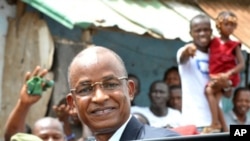Guinea's Supreme Court has rejected challenges to first-round results in the country's presidential poll, and a run-off between the two top-scoring candidates could now take place in as little as two weeks.
The head of Guinea's Supreme Court, Mamadou Sylla, announced definitive results Tuesday for the first round of the country's landmark presidential election that took place June 27.
The Supreme Court overruled challenges to the provisional results brought by many of the first round's 24 presidential candidates. The court threw out votes from five districts including a part of the capital Conakry, citing severe irregularities.
According to definitive results, former prime minister, Cellou Dallein Diallo, led the first round with 43 percent of votes, and long-time opposition leader, Alpha Conde, came in second, with 18 percent. Former prime minister, Sidya Toure, remained in third place with 13 percent.
Mr. Diallo and Mr. Conde will face off in a second round of voting the electoral commission says could take place within two weeks.
Spokesman Fodé Oussou Fofana, who represents Mr. Diallo's party, the Union for Democratic Forces in Guinea says Mr. Diallo's campaign will continue with its same strategy of fraternity among all Guineans. He says they are now reaching out to all political parties who share their vision for Guinea. He says the problem in Guinea is not ethnicity, but rather poverty. He says they are committed to bringing the country out of misery.
Coalition building is under way for the second round of voting.
Bakary Diabaté is spokesman for the party of candidate Lansana Kouyaté, who placed fourth in the first round.
Diabaté says there is still hope for Guinea and that they will not give up. He says choosing alliances for the run-off is a political decision. He says the party submitted its challenges to first-round results to the Supreme Court and the court has ruled. He says the party will now meet to decide its position for the second round.
The presidential poll is meant to return the country to civilian government after a military coup in December 2008 and many hope it will be the country's first free and fair presidential election since independence in 1958.
Despite logistical challenges, the first round of voting was largely applauded by international observers.
The electoral commission has not yet announced a date for the second round.
Guinea Presidential Run-Off Possible Within 2 Weeks




